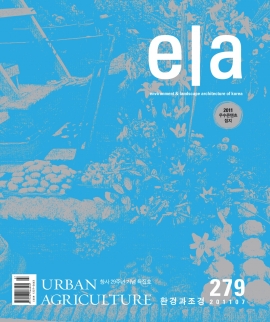농경은 농업에 대한 가장 보편적인 이해 이상으로 생산이라는 특권을 향한 인프라스트럭처와 어바니즘, 건축, 조경의 변형이다.
대부분의 나라에서처럼 한국도 산업화 이전에는 농업이 최우선적인 경제였다. 최초로 인간의 정주를 가능하게 한 농경은 가축뿐 아니라 토지에 대한 일종의 지배를 의미했다. 국제화를 낳은 산업화는 문화와 가정 형태를 변화시켰고 개발된 도시의 경관을 바꿨다. 서울의 부동산 시스템은 본질적으로 토지를 소유하는 것이 아니라 토지와 분리된 생활양식인 “아파트”가 지배적이다. 추상적인 가치이지만 하늘에 둘러싸인 공간은 실제 거래되는 공간의 재산 가치로서 시장성을 띠고 있다. 전통적인 가정의 사회 경제적·성적 역할은 결혼 패턴과 생활방식으로 인해 변화되었다. 그리고 한국의 식량과 가축 수입 의존도는 증가하고 있으며, 2001년에서 2005년 사이에 수입은 30%로 늘었고, 같은 시기의 농업 수출은 5%로 감소했다.
오늘날 서울같은 도시에 땅과는 분리된 생활환경이 이미 일상화 되어 있는 것을 고려해 볼 때,�농업을 공원이나 아파트 또는 인프라스트럭처의 주변 공간에 재분배한다고해서 ‘땅의 문화’를 다시 도입할 수 있을까? 도시농업이 지역적 생산을 통해 생태적이고, 경제적이며, 건강한 음식물을 안전하게 제공하는 등의 이점을 줄 수 있을까? 현대의 목축 농업을 낭만적으로 묘사한다면 다시 공공 공간의 기반을 만드는 방법이 될 수 있지 않을까?
가정의 변화 패턴과 함께 도시 경관에 대한 재이해는 “생산적”인 것이 무엇인지를 다시 생각하게 한다. 산업화 이전 시대부터 농업에 기반 한 경제와 생산은 인간중심적인 용어로 평가되었다. 환경 차원의 스펙트럼을 다루기 위해서는 단지 인간의 경제적, 사회적, 문화적 방법만이 아닌 그외 다양한 종의 동식물을 포함한, 새롭게 조정된 규모를 통해 생산을 재평가할 필요가 있다.
Farming, beyond its most common agricultural understanding is the modification of infrastructure, urbanisms, architectures, and landscapes toward a privileging of production.
Agriculture, as in most countries, was South Korea’s primary economy before industrialization. Farming, the earliest enabler of human settlement, represents a formal domestication of land as well as animals. With the globalism that emerged from industrialism, changing cultures and forms of domesticity have altered the developed landscapes of the city. In Seoul’s essentially nomadic real estate system, the dominant “apart” [apartment] style of living space is separated from a collectively experienced - if not owned - ground.
Abstracted property, enclosed sky space, has assumed a marketable value, a kind of spatial currency that is frequently traded.
Traditional socioeconomic and gender roles in households are changing with altered forms of domesticity, along with marriage patterns and lifestyles. And South Korea’s dependency on food and live animal imports is growing - by 30% from 2001 to 2005, as its agricultural exports decline - by 5% in the same period.
In the present de-grounded, disseminated domestic environment of cities like Seoul, could redistribution of agriculture into the shared spaces of the city reintroduce a “land culture” to the spaces of parks, apart landscapes, and the margins of infrastructure? Can urban agriculture offer a collective approach to the compelling ecological, economic, health and food security benefits of localized production? Might contemporary pastoralism, even or especially when romanticized, become also a way to re-ground public space?
The reconception of the urban landscape with changing patterns of domesticity entails reconsideration of what is “productive.”From the time of pre-industrial, agriculture-based economies, production has been measured in anthropocentric terms. To address a spectrum of environmental parameters, it has become necessary to reevaluate production through scales calibrated on multiple species, animal and vegetable, in addition to and alongside human social and economic measures.





